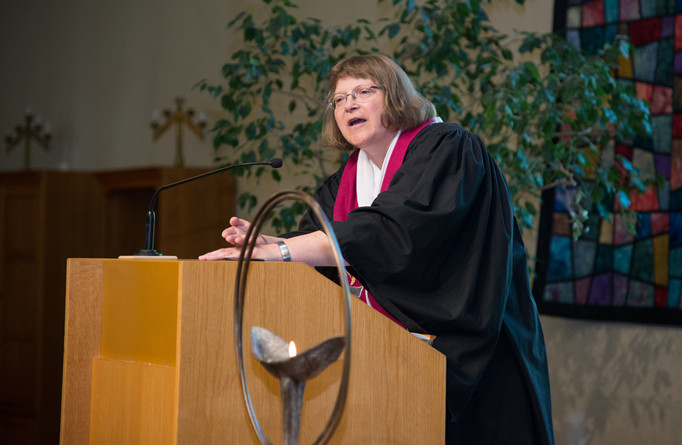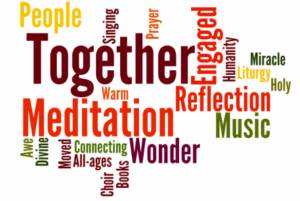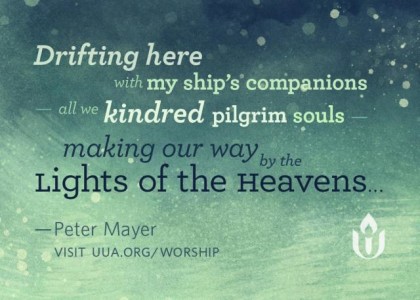Worship
Worship is at the heart of the congregation. What we do, on Sundays and whenever else we gather to make meaning of our lives, is central to congregational identity. Worship matters.
Worship helps us to
- connect with a sense of wonder and mystery
- learn
- be challenged
- feel deeply connected with those who gather with us
When we worship, we are collectively focusing on the things that matter: on what we believe, on what we know about human longing and fallibility, and on the nature of our relationships. We are focusing on shaping worth.
Good worship helps those present to connect with their highest understanding, values, and meaning. Worship may be formal or informal, led by a minister or a layperson; and sometimes we get muddled by the many forms and possibilities it offers. Remember that each of these has a place in the life of a congregation. Each can be appropriate, depending on the goals of a particular worship service. Worship can take innumerable shapes! But good worship encourages everyone, regardless of their age and their role in the congregation, to bring care and intention to the service.
Lay leaders should be involved in worship! Their presence reminds us that insight, revelation, and teaching are not the exclusive territory of ministers, and helps us understand the many ways we can worship together. They should be supported and trained in the skills needed to craft quality worship.
Quality worship may share some characteristics of theatre, but it is not a performance. Together, worship leaders and the congregation create a space for authenticity, exploration, wonder, learning, and deepening. Worship leaders who bring the best of themselves, and also share their vulnerability, invite others to do the same.
Worship Resources
- In most of our congregations, members of the community regularly help organize and present services. The people who do this may be called worship associates, service weavers, liturgists, or some other term chosen by the congregation. On some Sundays they may work with a minister or guest speaker; on others they may plan and lead a whole service themselves, delivering a reflection, selecting songs and readings, and leading prayer or meditation. The CUC’s Congregational Life staff can help you train these member volunteers.
- Many of our congregations post sermons to their website. These are wonderful resources! They can offer inspiration as you set out to write a sermon of your own, or you could choose to present one of them instead of writing your own. Look through the websites of other Unitarian Universalist congregations and discover what they have to offer.
- WorshipWeb, maintained by the Unitarian Universalist Association, is a treasure trove of prayers, stories, readings, images, sermons, and rituals. You can find information on multicultural and multigenerational worship, suggestions for incorporating music and technology, and much more.
Music in the Congregation
 Music washes away from the soul the dust of everyday life. —Berthold Auerbach
Music washes away from the soul the dust of everyday life. —Berthold Auerbach
After silence, that which comes nearest to expressing the inexpressible is music. —Aldous Huxley
People access information, engage with it, and learn in different ways. Some people use words as a path to meaning, some use art and imagery, or music and other sounds, or movement, or something else; and of course most of us use many of these, perhaps at different times or for different reasons, and often several at once. Using multiple elements and formats in worship makes it more complex and meaningful for everyone. Music and poetry invite nonliteral understandings and help us to engage with myth and story. Because we don’t expect them to be literal, they help us engage with the rich theological diversity present in our congregations.
Often we strive for concert-quality music in worship. Certainly it’s lovely when we get it! However, amateur music, offered with care and attention by members of the congregation, can also be meaningful. A vital musical program offers material from different genres, including classical, folk, chant, rock, and others, so that as many people as possible find something familiar to connect to and something new to discover.
Congregational singing is an important element of community building. Voices raised in harmony are a powerful metaphor for community life, and singing together helps us, at a physiological level, to connect with one another. Singing together, we work together to create beauty, and use diversity to build a common goal. The act of singing together can bring groups into physical alignment. Group singing is relaxing, helps us control our breathing, and leads to a regular heartbeat. Feeling physically good together is good for a community. Singing in worship provides a physical and artistic balance to time spent sitting and listening.
Many congregations have some professional music staff, whether hired week by week or signed to year-long contracts. Congregations are encouraged to budget to enable key musical staff and volunteers to join relevant professional organizations and attend their conferences.
Music Resources
- The Unitarian Universalist Musicians Network (UUMN) connects Canadian and American musicians to one another and to resources (including a large database of music), and offers online discussions as well as an annual conference.
- The Unitarian Universalist Association offers a wide variety of music resources. For help with music staffing, including position descriptions and budgeting, the UUMN offers Music in Our Congregations: A Handbook for Staffing a Music Program in UU Congregations (PDF).
